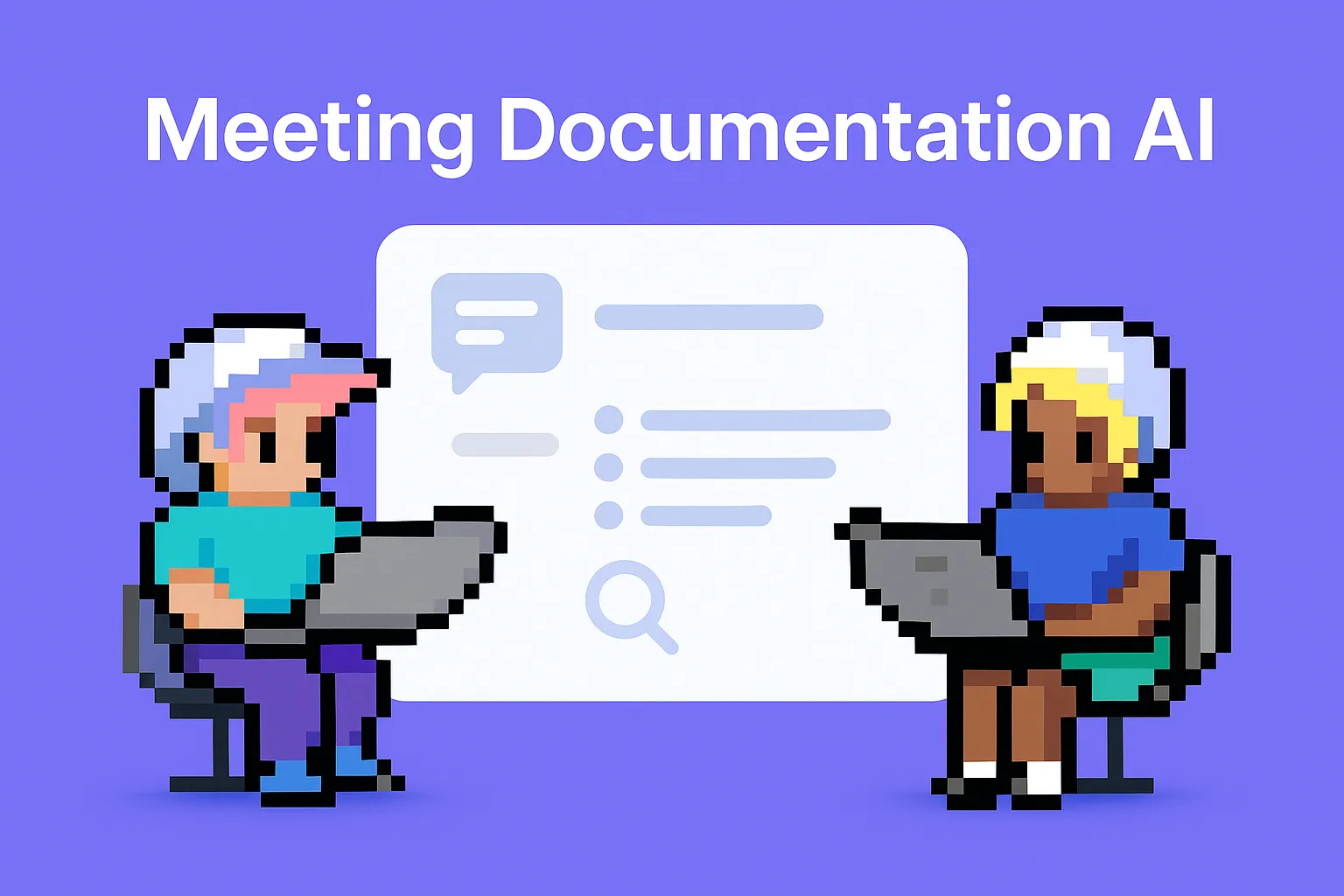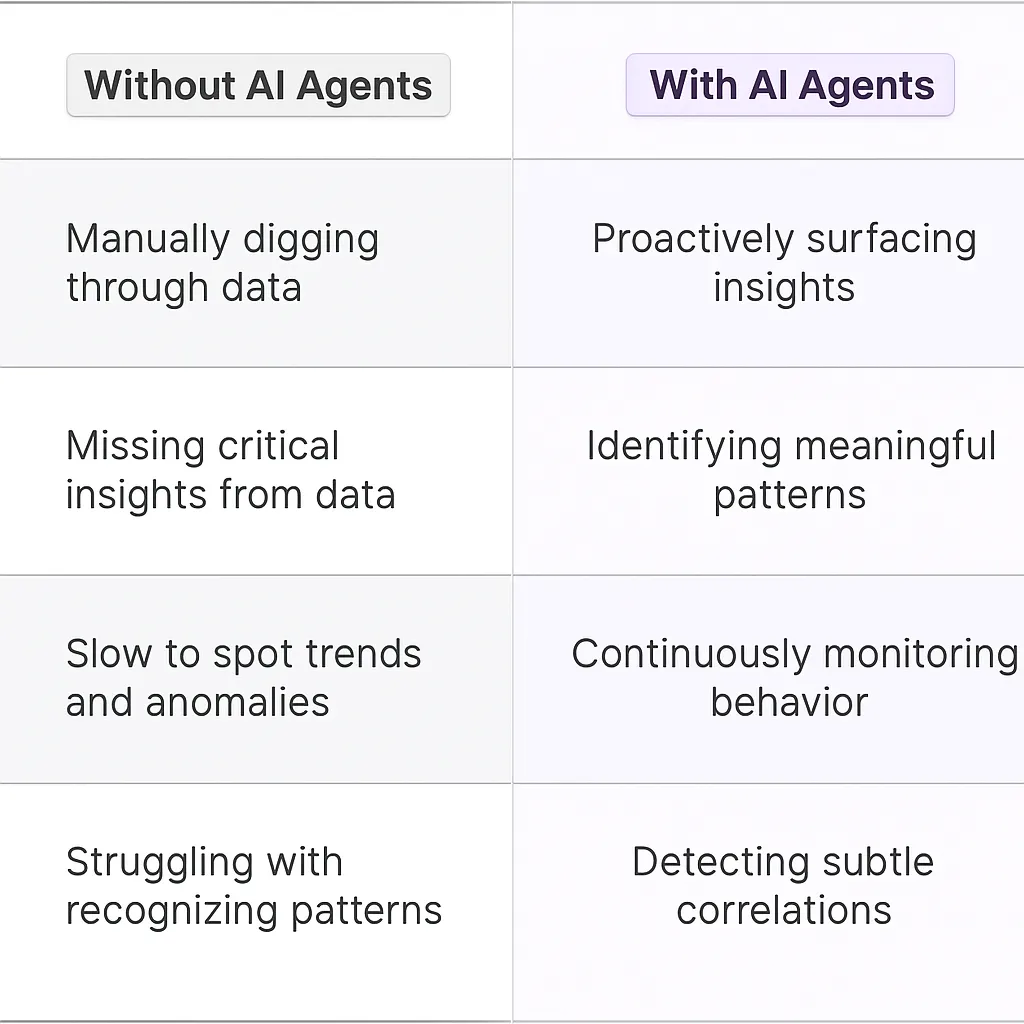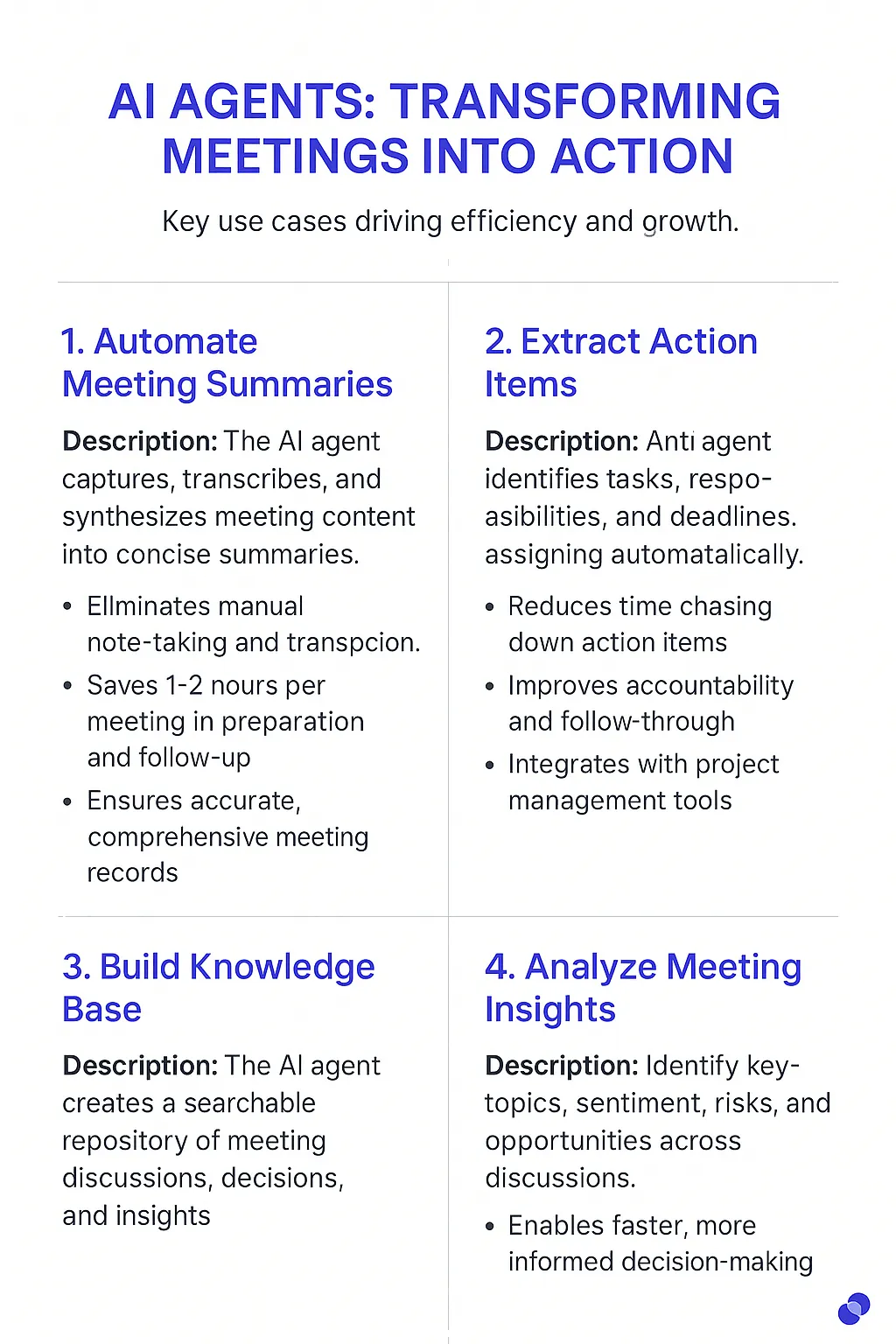Fathom
Understanding Fathom's AI-Powered Meeting Intelligence Platform
Fathom is a sophisticated AI-powered platform that transforms how organizations capture, analyze, and act on meeting intelligence. The platform deploys advanced AI Agents that work alongside human teams to handle meeting documentation, extract key insights, and drive action items forward. Unlike basic transcription tools, Fathom's technology understands context, identifies patterns, and learns from organizational knowledge to deliver increasingly valuable insights over time.

Benefits of AI Agents for Fathom
What would have been used before AI Agents?
Traditional analytics tools like Google Analytics required teams to manually dig through data, create custom reports, and piece together insights from multiple dashboards. Marketers and product teams spent countless hours trying to understand user behavior patterns, often getting lost in endless rows of spreadsheets and complex data visualizations. The process was time-consuming, prone to human error, and frequently missed critical insights buried in the data.
What are the benefits of AI Agents?
AI Agents transform analytics from a passive data collection tool into an active digital teammate that proactively surfaces meaningful patterns. These agents continuously monitor website traffic, user behavior, and conversion metrics to identify significant trends and anomalies that human analysts might miss.
The agents excel at pattern recognition across massive datasets, detecting subtle correlations between user actions, traffic sources, and conversion events. When unusual patterns emerge - like a sudden drop in mobile conversions or an unexpected surge in traffic from a specific geographic region - the AI immediately flags these insights for investigation.
Beyond basic monitoring, these digital teammates can:
- Generate comprehensive attribution models showing the true impact of marketing channels
- Predict future traffic patterns based on historical data and seasonal trends
- Identify user segments that are most likely to convert
- Surface technical issues affecting site performance before they impact revenue
- Automatically adjust tracking parameters as user behavior evolves
The real power comes from the agents' ability to learn from each interaction, continuously refining their analysis to focus on metrics that matter most to each organization's unique goals. This creates a virtuous cycle where insights become increasingly targeted and actionable over time.
For growing companies, these AI capabilities effectively multiply the bandwidth of analytics and marketing teams. Rather than spending hours manually analyzing data analysis, teams can focus on strategic initiatives while their digital teammates handle the heavy lifting of data analysis and insight generation.

Potential Use Cases of AI Agents with Fathom
Processes
Fathom AI agents transform meeting dynamics by handling the heavy lifting of documentation and follow-up. They capture and synthesize conversations in real-time, creating structured meeting summaries that actually reflect how humans process information.
The agents excel at identifying action items and decision points during meetings, tagging them appropriately, and routing them to the right team members. This creates a seamless bridge between discussion and execution.
Meeting transcription becomes truly intelligent - beyond basic speech-to-text, Fathom agents understand context, detect sentiment, and highlight key moments that matter. They can flag potential risks, surface opportunities, and maintain institutional knowledge that compounds over time.
Tasks
Fathom's digital teammates handle crucial but time-consuming meeting tasks:
- Creating detailed meeting summaries with key topics, decisions, and next steps clearly outlined
- Automatically generating and assigning action items to team members
- Building searchable knowledge bases from meeting content
- Identifying patterns and trends across multiple meetings
- Tracking project progress and milestone completion
- Maintaining meeting compliance and governance records
The agents reduce cognitive load by managing meeting logistics and documentation, allowing humans to focus fully on high-value discussion and decision-making. They create a continuous feedback loop of insights that helps teams optimize their meeting culture over time.
For product teams, Fathom agents can track feature requests and user feedback mentioned during customer calls. Sales teams benefit from automated deal notes and follow-up task creation. Executive teams gain visibility into organizational alignment through cross-meeting analysis.
The true power comes from Fathom agents' ability to learn your organization's context and terminology over time, becoming increasingly valuable partners in running effective meetings that drive real business outcomes.

Industry Use Cases
Fathom AI agents are transforming how businesses operate across sectors, with distinct applications that solve real operational challenges. The technology's ability to understand context, learn from interactions, and execute complex tasks makes it particularly impactful in environments where data analysis and decision-making are crucial. By analyzing patterns in how teams work and adapting to specific industry needs, these digital teammates create meaningful improvements in productivity and outcomes.
What makes Fathom's approach unique is its focus on becoming an integral part of existing workflows rather than forcing teams to adapt to new systems. This seamless integration means professionals can maintain their established processes while gaining the advantages of AI-powered insights and automation. The real value emerges when we examine how different sectors leverage these capabilities to address their specific challenges and opportunities.
Looking at actual implementations across industries reveals a pattern: the most successful deployments occur when organizations identify precise use cases where AI can enhance human capabilities rather than replace them. This targeted approach leads to measurable improvements in both efficiency and quality of work.
Accounting Firms Transform Client Advisory with Fathom AI
Modern accounting firms face a critical challenge: delivering high-value advisory services while managing increasing client loads. Fathom AI agents fundamentally shift how accounting professionals analyze financial data and communicate insights to clients.
A mid-sized accounting firm handling 200+ clients can deploy Fathom AI to continuously monitor key financial metrics across their entire client portfolio. The AI identifies concerning trends like declining gross margins or working capital constraints before they become critical issues.
When the AI detects potential problems, it automatically generates detailed analyses with specific recommendations. For example, if a retail client's inventory turnover drops below industry benchmarks, the AI produces a breakdown of slow-moving SKUs and suggests inventory optimization strategies.
Beyond monitoring, Fathom AI transforms client meetings from backward-looking reviews into forward-focused strategic sessions. The AI preps comprehensive meeting briefs with visualized trends, peer benchmarking, and discussion points tailored to each client's business model and growth stage.
The network effects are particularly powerful - as Fathom AI analyzes more companies within specific industries, it develops increasingly sophisticated pattern recognition. An accounting firm can leverage these insights to help clients make better operational and strategic decisions.
For accounting firms, this capability creates a compelling differentiation in a competitive market. Rather than competing solely on tax preparation or compliance work, firms can position themselves as proactive advisors who leverage AI to spot opportunities and risks their clients might otherwise miss.
E-commerce Brands Scale Financial Intelligence with Fathom AI
E-commerce companies operate in a complex web of inventory management, marketing spend, and razor-thin margins. Fathom AI agents are becoming the secret weapon for online retailers trying to crack the unit economics puzzle while scaling operations.
Take a typical DTC brand doing $10M in annual revenue. Their finance team juggles multiple marketing channels, SKU-level profitability, and seasonal inventory planning. Fathom AI monitors these interconnected metrics in real-time, spotting critical patterns human analysts might miss.
The AI's pattern recognition capabilities shine when analyzing marketing efficiency. It tracks how changes in ad spend across channels impact not just revenue but contribution margin per order. When Facebook CPMs spike during Q4, the AI automatically adjusts ROAS targets and recommends budget reallocation to maintain profitability.
Inventory management gets a major upgrade too. The AI learns seasonal demand patterns at the SKU level and factors in supply chain lead times. A beauty brand running flash sales can now predict stock requirements 6 months out with 90%+ accuracy, reducing both stockouts and excess inventory costs.
The network effects are particularly fascinating. As more e-commerce brands use Fathom AI, it develops sophisticated benchmarks for metrics like customer acquisition costs and lifetime value across different product categories. A new brand can tap into these insights to avoid costly mistakes in their growth journey.
Most importantly, Fathom AI serves as a strategic co-pilot for e-commerce leaders. During weekly financial reviews, it surfaces the metrics that actually matter - like contribution margin trends by customer cohort - and suggests specific actions to improve them. This transforms financial analysis from a backward-looking exercise into a forward-looking strategic advantage.
For e-commerce brands competing in crowded markets, this AI-powered financial intelligence becomes a crucial differentiator. The companies that harness it effectively are building stronger unit economics and more sustainable growth trajectories.
Considerations and Challenges
Implementing Fathom AI Agents requires careful planning and strategic thinking across multiple dimensions. Organizations need to evaluate their readiness and address several key areas before deployment.
Technical Challenges
Data integration poses significant complexity when deploying Fathom AI Agents. Teams must ensure clean data pipelines, proper API connections, and robust error handling. The technical infrastructure needs to support real-time processing while maintaining data security standards.
System compatibility often creates friction points, especially in organizations with legacy systems. Engineering teams need to carefully architect solutions that bridge these technological gaps without disrupting existing workflows.
Operational Challenges
Change management becomes critical when introducing Fathom AI Agents into established processes. Teams need clear guidelines on when to engage the AI versus handling tasks manually. This requires developing new standard operating procedures and training protocols.
Resource allocation presents another hurdle. Organizations must dedicate time for initial setup, ongoing maintenance, and continuous optimization. This includes designating technical owners, establishing monitoring protocols, and creating feedback loops for improvement.
Cultural Adaptation
Team dynamics shift when introducing AI capabilities. Some employees may feel threatened or uncertain about their roles. Creating a culture of collaboration between human team members and digital teammates requires intentional effort and clear communication about how AI augments rather than replaces human work.
Governance Considerations
Organizations need robust governance frameworks to manage AI deployment. This includes establishing usage policies, defining accountability structures, and creating audit trails. Privacy concerns and data handling protocols must align with regulatory requirements and internal compliance standards.
Success metrics need careful definition to measure both quantitative improvements and qualitative impacts. Teams should track not only efficiency gains but also user satisfaction and adoption rates.
The key to successful data integration lies in understanding both the technical requirements and the human factors that influence adoption and effectiveness.
Transformative Impact of AI Integration in Modern Organizations
The integration of AI Agents through Fathom marks a fundamental shift in how organizations operate and make decisions. These digital teammates don't just automate tasks - they enhance human capabilities by surfacing insights that would otherwise remain hidden in the noise of daily operations. As organizations continue to adopt this technology, the network effects become increasingly powerful, creating a compound advantage for early adopters. The key to success lies in thoughtful implementation that considers technical requirements, operational processes, and cultural dynamics. Those who master this integration will find themselves with a significant competitive advantage in their respective markets.













